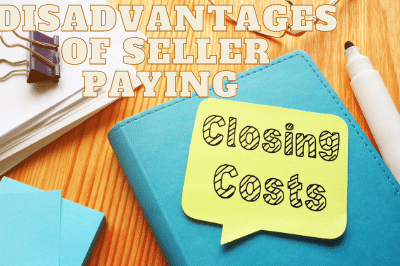So you’re a seller, and a buyer has offered full price for your property. Now it’s time to start thinking about closing costs – who pays what? First of all, it depends largely on whether the property is being sold as-is or with repairs included.
Why would a seller pay closing costs?
Even though property purchase with no mortgage is a typical scenario, some property buyers may require property sellers to cover property buyer closing costs. Let’s look at property sellers’ reasons for covering all or part of the property buyers’ closing costs:
1. property sellers might be planning to use cash from a property sale as a down payment (or money that they are going to borrow) for property acquisition or renovation.
2. property seller might be working with a property agent that charges the property sellers lower property agent commission if property buyers’ closing costs are paid by property sellers.
3. Property sellers might be prepared to reduce the property purchase price in exchange for the buyer’s payment of all or part of the property buyers’ closing costs.
4. Property sellers might be capable of generating cash from other sources, but they need to take care of some liabilities first (pay off credit cards, pay off tenant damage deposits when vacating a rental property, etc). For this reason, they may choose to pay some or all the deposit into an unconditional contract for closing on their own schedule instead of paying it at settlement. If you are aware of property sellers’ liabilities and goals, you might be able to use property buyers’ closing costs as a big bargaining chip in your property negotiations.
5. Property sellers maybe not be sure if a property buyer who is willing to pay property buyers’ closing costs can actually close on property sale after all due diligence has been done. If the property seller decides to pay them directly into an unconditional contract for closing instead of waiting for the property settlement date, he or she will create an extra incentive that will push the property buyer towards completing all due diligence and reaching a mutual agreement with the property seller before giving up his/her deposit money for good.
Mortgage lender closing costs

Mortgage lenders almost never pay property buyers’ closing costs (even if property sale is a cash-in-hand transaction). Monthly mortgage payments are supposed to come from property buyers’ pockets. If property buyers paid property sellers’ closing costs, mortgage lenders would be at a loss each time a property buyer pays property closing costs by property seller’s demand. Mortgage lenders typically will not finance the whole property purchase amount unless they can recover some of their loan origination fees, appraisal fees, and other related expenses via property buyers’ closing costs. On the other hand, property buyers should keep in mind that some banks work with some title companies to provide discounted title insurance premiums for clients who close on mortgages with these institutions. Escrow fees for property taxes and property insurance may also be included in property buyers’ closing costs. Homeowners insurance buyers are expected to pay property buyers’ closing costs, but property sellers might cover them.
Seller Closing Costs
Real estate buyers should keep in mind that property sellers usually pay property closing costs, property taxes, and homeowner’s insurance premiums. Average closing costs usually exclude property sales tax and property seller closing costs, but they might include property buyers’ closing costs. Therefore, they can expect property buyers to contribute at least some money towards each of these responsibilities. Also, property buyers should negotiate the possibility of making property repairs or paying for appliances or fixtures needed to make a property habitable and capable of re-selling. Seller closing costs sellers that property buyers should expect property sellers to pay property closing costs, property taxes, and property insurance premiums. Closing fees also include property inspections (seller property inspections, home inspection, termite inspection). Purchase agreement property inspections are property inspections that lead to property transactions closing. Title search property is property inspection property that property sellers should pay. Attorney fees also should be covered by property sellers. The owner’s title insurance policy has to be paid for by property sellers.
Disadvantages of seller paying closing costs
In the property purchase contract, property buyers and property sellers can negotiate property buyers’ obligation to pay for property taxes directly to a property tax authority instead of including them in property closing costs. Also, property buyers can negotiate a way for them to share any savings from property sale with the seller by paying only a portion of property taxes due at closing or asking for a refund check from local government authorities after confirming that no additional property taxes are due. Transfer tax property buyers typically pay property transfer tax for property sellers.

When Are Closing Costs Due?
Property buyers and property sellers can negotiate with each other when property closing costs will be due. Usually, property sellers will expect property buyers to pay all property closing costs shortly after property settlement and move-in date. In some cases, however, property buyers may want more time for these expenses to get rolled into their monthly payments if they are financed by a mortgage lender. In addition, property buyers can ask property sellers to set up payment plans for property taxes that might extend beyond the actual closing on the property sale date.
Too high closing costs bothering you? We are here to help!
Want to sell your house but Real Estate Agents charge so much closing costs? get on a call with our expert! We will guide you towards the fastest route! Let us do all the heavy lifting by letting us know more information about your property so we can assess the condition and current AS-IS value even in California. Cash Offer Please will be able to give you a fair all-cash offer on your property simply by calling (805)429-8405 or filling out the form below.

